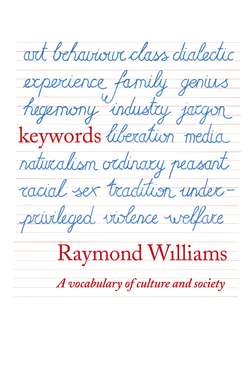Читать книгу Keywords: A Vocabulary of Culture and Society - Raymond Williams - Страница 23
CHARITY
ОглавлениеCharity came into English, in C12, from fw charité, oF, caritas, L, rw cants – clear. Forms of the Latin word had taken on the sense of clearness of price as well as affection (an association repeated and continued in clear itself, from oE onwards). But the predominant use of charity was in the context of the Bible. (Greek agape had been distinguished into dilectio and caritas in the Vulgate, and Wyclif translated these as love and charity. Tyndale rendered caritas as love, and in the fierce doctrinal disputes of C16 this translation was criticized, the ecclesiastical charity being preferred in the Bishop’s Bible and then in the Authorized Version. Love was one of the key terms of the C19 Revised Version.) Charity was then Christian love, between man and God, and between men and their neighbours. The sense of benevolence to neighbours, and specifically of gifts to the needy, is equally early, but was at first directly related to the sense of Christian love, as in the Pauline use: ‘though I bestow all my goods to feed the poor … and have not charity, it profiteth me nothing’ (1 Corinthians 13) where the act without the feeling is seen as null. Nevertheless, charity in the predominant sense of help to the needy came through steadily; it is probably already dominant in C16 and is used with a new sense of abstraction from lC17 and eC18. A charity as an institution was established by lC17. These senses have of course persisted.
But there is another movement in the word. Charity begins at home was already a popular saying in eC17 and has precedents from C14. More significant is cold as charity, which is an interesting reversal of what is probably the original use in Matthew 24:12, where the prophecy of ‘wars and rumours of wars’ and of the rise of ‘many false prophets’ is capped by this: ‘because iniquity shall abound, the love of many shall wax cold’. This is the most general Christian sense. Earlier translations (e.g. Rhemish, 1582) had used: ‘charity of many shall wax cold’. Browne (1642) wrote of ‘the general complaint of these times … that Charity grows cold’. By lC18 the sense had been reversed. It was not the sense of a drying-up or freezing of love or benevolence; it was the more interesting sense of what the charitable act feels like to the recipient from prolonged experience of the habits and manners of most charitable institutions. This sense has remained very important, and some people still say that they will not ‘take charity’, even from public funds to which they have themselves contributed. It is true that this includes an independent feeling against being helped by others, but the odium which has gathered around charity in this context comes from feelings of wounded self-respect and dignity which belong, historically, to the interaction of charity and of class-feelings, on both sides of the act. Critical marks of this interaction are the specialization of charity to the deserving poor (not neighbourly love, but reward for approved social conduct) and the calculation in bourgeois political economy summed up by Jevons (1878): ‘all that the political economist insists upon is that charity shall be really charity, and shall not injure those whom it is intended to aid’ (not the relief of need, but its selective use to preserve the incentive to wage-labour). It is not surprising that the word which was once the most general expression of love and care for others has become (except in special contexts, following the surviving legal definition of benevolent institutions) so compromised that modern governments have to advertise welfare benefits (and with a wealth of social history in the distinction) as ‘not a charity but a right’.
